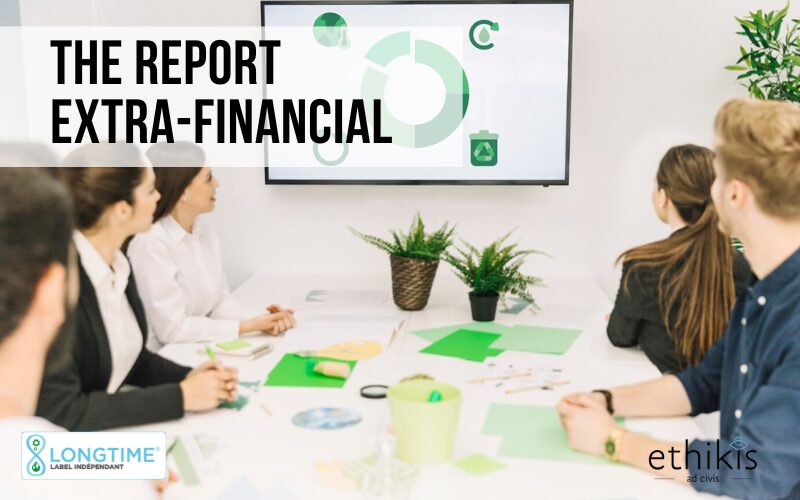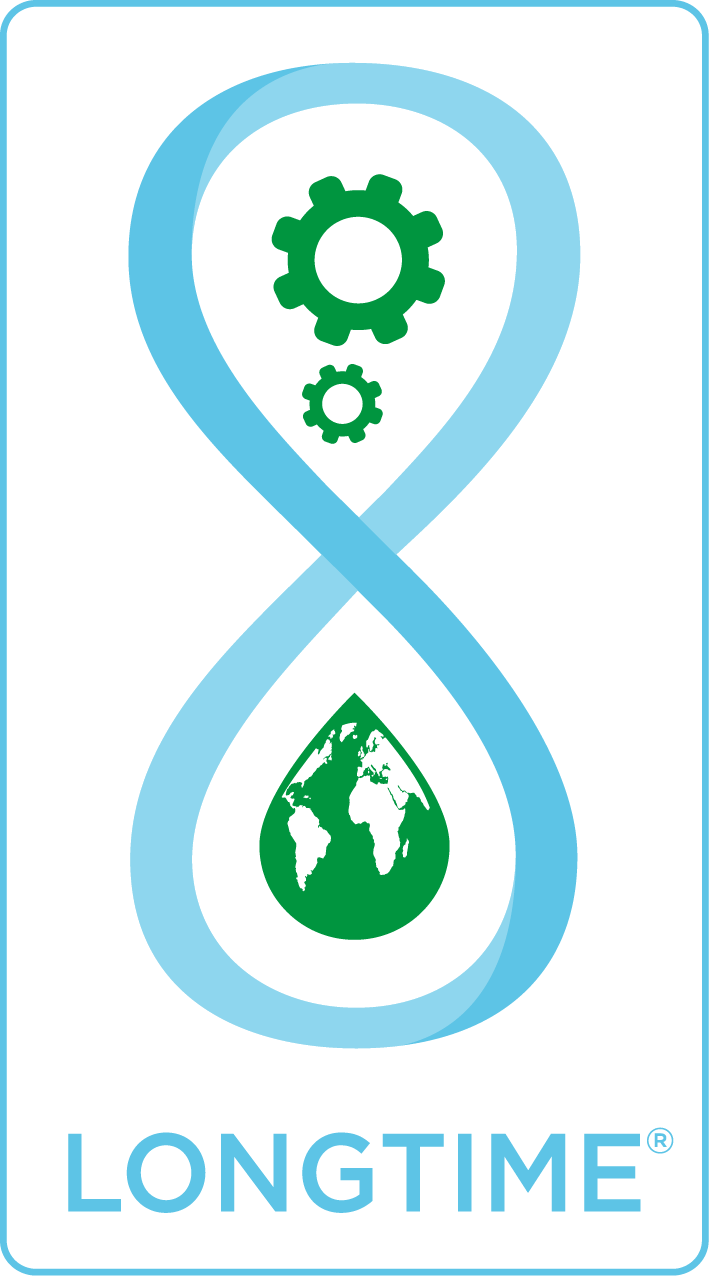
The non-financial report is a highly relevant tool for communicating in terms of CSR. Are you having trouble navigating the regulatory texts associated with writing this report? Well, we’ve done it for you.
We will help you understand how to structure it clearly and effectively.
What is a non-financial report?
A non-financial report is a document published by an organisation, usually a company, to report on its performance and commitments in terms of social, environmental and societal responsibility. This report complements a company’s usual financial information by providing details of its activities and impacts in these non-financial areas.
These documents reflect their policies and strategies for reducing their carbon footprint and aligning their business with sustainable development objectives. Using a range of indicators, stakeholders can assess the organisation’s efforts to make the transition to a greener future. In this way, the reports demonstrate the company’s commitment to operating responsibly and responding to growing concerns about climate change.
To avoid getting lost, here are the definitions of a few acronyms:
- EFPD : Extra-financial Performance Declaration
- NFRD : Non Financial Reporting Directive
- CSRD : Corporate Sustainability Reporting Directive
- CRS : Corporate Social Responsibility
- ESRS : European Sustainability Reporting Standard
What are the regulations governing non-financial reporting?
The non-financial report, otherwise known as the EFPD : Extra-financial Performance Declaration is the result of a European directive dating from 2014, the NFRD (Non Financial Reporting Directive) and relating to extra-financial reporting. This was transcribed into French law under Ordinance No. 2017-1180 of 19 July 2017 on the publication of non-financial information by certain large companies and certain groups of companies. These replace what was previously known as “CSR reporting”.
In 2022, the European NFRD directive was replaced by the CSRD (Corporate Sustainability Reporting Directive), which came into force on 1 January 2024. The CSRD (formerly NFRD) requires manufacturers to include, in a specific section of the management report, the information needed to understand their impact on sustainable development issues.
They will also have to include the information needed to understand how these sustainability issues affect the development of their business, their results and their situation.
In a nutshell:
- 2014 Adoption of the European NFRD directive
- 2022 Integration of the NFRD into a more global directive: the CSRD
- 2024 Implementation of the CSRD
Which companies are concerned by the non-financial report and its associated CSR approach?
Large companies are obliged to draw up their non-financial report or EFPD. For companies not covered by this obligation, the EFPD remains a very useful document for SMBs, and it can very well be produced voluntarily.
What does French law say about non-financial reporting?
Decree no. 2017-1265 of 9 August 2017 sets out the characteristics of companies required to produce a non-financial report:
- Listed company
- A balance sheet total of €20 million or net sales of €40 million
- 500 employees
- Unlisted company with total sales of 100 million euros with 500 employees
In which parts of the non-financial report can the LONGTIME® label be used?
The non-financial performance declaration contains information on the main areas of sustainable development: social data, environmental data. The environmental aspect is at the heart of the LONGTIME® labelling process. You can therefore easily promote the LONGTIME® label in this section.
In fact, your non-financial report is an excellent way of complying with the law while at the same time communicating concretely in terms of CSR and, in particular, environmental improvement, by including concrete elements linked to the LONGTIME® label and the sustainability of your products. The information contained in the report must be published in accordance with the European Sustainability Reporting Standards (ESRS), which must specify the content and, where appropriate, the structure to be used for the presentation of this information.
In simple terms, each paragraph of the non-financial report can be associated with an ESRS standard which describes and structures the data it must contain, as defined by EFRAG (European Financial Reporting Advisory Group).
The ESRS (European Sustainability Reporting Standard) are European standards for sustainability reporting, covering ESG (Environmental, Social and Governance) aspects and aiming to guarantee the transparency and quality of information. They are part of the CSRD and complement European regulations on non-financial reporting, with a gradual implementation between 2024 and 2028, including sector-specific standards.
The sections in which the LONGTIME® label is used are detailed, and there are about fifteen of them!

Detailed plan based on ESRS
Below is a detailed outline of the non-financial report based on the ESRS standards. The letter in the name of the standard describes the aspect it targets (E: Environment, S: Social, G: Governance).
ESRS E1 - Climate change
-
Sustainable use of resources
Theme: sustainable management of natural resources, in particular the protection of fragile ecosystems, the preservation of biodiversity and the promotion of responsible water management by extending the life of products through the LONGTIME® label.
-
Reduction of GHG emissions:
Theme: implementing measures to reduce GHG emissions, such as switching to cleaner energy sources, improving energy efficiency, reducing dependence on fossil fuels and extending product lifetimes with the LONGTIME® label.
The LONGTIME® label does not appear to be suitable for ESRS E1 points:
- Adaptation to climate change
- Assessment of greenhouse gas (GHG) emissions
- Corporate responsibility
- Reporting and communication
- Awareness-raising and training
- Collaboration
ESRS E2 - Pollution
-
Management of chemicals and hazardous substances
Theme: how the organisation manages chemicals and hazardous substances, including their storage, safe handling and disposal. This point is checked during the LONGTIME® audit and is one of the criteria in our sectoral standards.
-
Prevention measures
Preventive measures put in place to minimise pollutant emissions or discharges. It should highlight the specific actions taken to reduce pollution at source. The long life of LONGTIME® labelled products
LONGTIME® label prevents the accumulation of premature waste.
-
Waste management and Extended Producer Responsibility (EPR)
Theme: waste management, in particular sorting, recycling, reuse and reducing waste production. It must explain how the organisation minimises its environmental impact by effectively managing waste. This point is checked during the LONGTIME® audit and is one of the criteria in our sectoral standards.
-
Regulatory compliance
Theme: compliance with environmental laws and regulations relating to pollution. It should also indicate whether the organisation exceeds regulatory standards and how it is committed to achieving higher standards where possible. This point is checked during the LONGTIME® audit and is one of the criteria in our sectoral standards.
The LONGTIME® label does not appear to be suitable for ESRS E2 points:
- Identification of sources of pollution
- Emission control
- Emergency preparedness
- Awareness-raising and training
.
ESRS E5 - Resource use and circular economy
-
Sustainable design
Theme: design of products, services and systems that take account of the entire life cycle, from production to end of life, with the emphasis on reducing the consumption of raw materials and energy.
Products with the LONGTIME® label are designed to last over time, they are reliable and repairable. It is within the chapter that the LONGTIME® label should be promoted, by detailing the characteristics of your products that make them sustainable.
-
Resource management
Theme: responsible management practices for natural resources, including reduced consumption of water, energy and raw materials, as well as the adoption of cleaner and more efficient technologies.
Marketing products with the LONGTIME® label that are designed to last helps to conserve resources. The longer products last, the less resources and raw materials need to be extracted to replace products that fail prematurely and cannot be repaired.
-
Industrial ecology
Theme: development of industrial synergies, where companies work together to share resources, waste and skills, thereby reducing their overall environmental impact.
Using the LONGTIME® label means joining a growing network of manufacturers committed to sustainable products. We support this network by sharing knowledge at regular intervals.
ESRS S4 - Consumers and end users
-
Consumer rights and customer service
Theme: Setting up an accessible and efficient customer service, capable of responding to consumers’ questions and concerns. Description of fundamental consumer rights, such as the right to information, the right to product safety and the right to protection against misleading advertising.
By labelling its products LONGTIME®, the manufacturer undertakes to respect the rights of consumers, by providing them with safe products, all the information they need to use, maintain and repair the product, and effective after-sales service.
-
Product safety
Theme: Guaranteeing the safety of products and services offered to consumers, by identifying and minimising health and safety risks.
-
Advertising and marketing
Theme: the use of honest and non-misleading advertising, and protection against unfair or fraudulent commercial practices.
Using the label to communicate the sustainability of your products is a guarantee of clear, transparent, scientifically robust communication verified by a third-party audit, in full compliance with the Green Claims anti-green washing directive.
-
Consumer education
Theme: Educating consumers to help them make informed purchasing decisions and understand their rights and responsibilities.
The fact that the label communicates transparently about the sustainability of products makes an effective contribution to educating consumers and raising their awareness of these important issues, and of the need to consume differently and sensibly.
The LONGTIME® label does not appear to be suitable for use in ESRS S4 points:
- Protection of personal data
- Dispute management
ESRS G1 - Business Conduct
-
Integrity and ethics
Theme: to develop a culture of integrity and ethics within the company, by encouraging honest, fair and morally responsible behaviour.
By mentioning in the LONGTIME® Conditions of labelling that the company is not involved in ethical violations or practices contrary to quality and ethics, such as programmed obsolescence, industrial espionage or tax fraud, the LONGTIME® label teams undertake to be in line with concerns relating to corporate ethics.
-
Protection of human rights
Theme: to affirm the importance of respect for human rights, by avoiding any discrimination, exploitation or violation of the fundamental rights of individuals throughout the company’s value chain.
The conditions for LONGTIME® labelling emphasise the importance of repairing any damage caused in the event of a major ethical or environmental violation. This reflects our commitment to taking responsibility for human rights, implementing corrective measures and working to reduce the potential negative impacts caused by our past actions.
-
Social responsibility
Theme: to demonstrate the company’s commitment to social responsibility, including positive contributions to local communities and the promotion of sustainable practices. The use of the LONGTIME® sustainability label plays an active role in promoting sustainable production and consumption practices.
The LONGTIME® label does not appear to be suitable for ESRS G1 points:
- Risk management
- Reports and audits on business conduct and ethical performance
- Transparency and disclosure
- Anti-corruption
- Conflicts of interest
ESRS which cannot be used
For your information, here are some existing ESRS for which it is not possible to use the LONGTIME® label.
- ESRS E3 – Aquatic and marine resources
- ESRS E4 – Biodiversity and ecosystems
- ESRS S1 – Company workforce
- ESRS S2 – Workers in the value chain
- ESRS S3 – Communities affected
